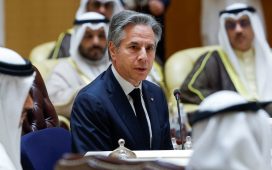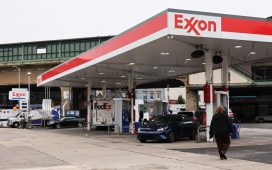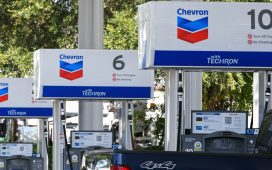PENALTIES KICKED: The Environmental Protection Agency (EPA) issued a sweeping suspension of its enforcement of environmental laws Thursday, telling companies they would not need to meet environmental standards during the coronavirus outbreak.
The temporary policy, for which EPA has set no end date, would allow any number of industries to skirt environmental laws, with the agency saying it will not “seek penalties for noncompliance with routine monitoring and reporting obligations.”
Cynthia Giles, who headed EPA’s Office of Enforcement during the Obama administration, called it a moratorium on enforcing the nation’s environmental laws and an abdication of EPA’s duty.
“This EPA statement is essentially a nationwide waiver of environmental rules for the indefinite future. It tells companies across the country that they will not face enforcement even if they emit unlawful air and water pollution in violation of environmental laws, so long as they claim that those failures are in some way ’caused’ by the virus pandemic. And it allows them an out on monitoring too, so we may never know how bad the violating pollution was,” she wrote in a statement to The Hill.
The EPA has been under pressure from a number of industries, including the oil industry, to suspend enforcement of a number of environmental regulations due to the pandemic.
“EPA is committed to protecting human health and the environment, but recognizes challenges resulting from efforts to protect workers and the public from COVID-19 may directly impact the ability of regulated facilities to meet all federal regulatory requirements,” EPA Administrator Andrew Wheeler
In a 10-page letter to EPA earlier this week, the American Petroleum Institute (API) asked for a suspension of rules that require repairing leaky equipment as well as monitoring to make sure pollution doesn’t seep into nearby water.
Other industries had also asked to ignite the “force majeure” clauses of any legal settlements they had signed with EPA, allowing for an extension on deadlines to meet various environmental goals in the face of unforeseen circumstances.
But Giles and others say the memo signed Thursday goes beyond that request, giving industries board authority to pollute with little overnight from the agency.
“Incredibly, the EPA statement does not even reserve EPA’s right to act in the event of an imminent threat to public health,” Giles said.
“Instead, EPA says it will defer to states, and ‘work with the facility’ to minimize or prevent the threat. EPA should never relinquish its right and its obligation to act immediately and decisively when there is threat to public health, no matter what the reason is. I am not aware of any instance when EPA ever relinquished this fundamental authority as it does in this memo.”
The memo says companies should try to minimize “the effects and duration of any noncompliance” with environmental laws, and should also keep records of their own noncompliance, along with identifying how the coronavirus was a factor.
Read more about the suspension here.
HAPPY THURSDAY! Welcome to Overnight Energy, The Hill’s roundup of the latest energy and environment news. Please send tips and comments to Rebecca Beitsch at rbeitsch@thehill.com. Follow her on Twitter: @rebeccabeitsch. Reach Rachel Frazin at rfrazin@thehill.com or follow her on Twitter: @RachelFrazin.
NOT BARRELING FORWARD: The future of the Trump administration plan to purchase millions of barrels of oil is in doubt after the Senate declined to provide funding for the purchase in its latest coronavirus stimulus package.
The Energy Department withdrew its solicitation to buy oil for storage in the Strategic Petroleum Reserve (SPR) on Wednesday.
“Given the current uncertainty related to adequate Congressional Appropriations for crude oil purchases associated with the March 19, 2020 solicitation, the Department is withdrawing the solicitation,” the department said in a withdrawal document.
“Should funding become secure for the planned purchases, the Department will reissue the solicitation,” it continued.
The department has said that it would initially purchase 30 million barrels of oil after President Trump
As of Thursday morning, oil was selling for nearly $24 per barrel, meaning to purchase 30 million barrels would cost more than $700 million.
Senate Minority Leader Charles Schumer
Energy Secretary Dan Brouillette is calling on Congress to provide funding as soon as possible, according to department spokeswoman Shaylyn Hynes.
“President Trump’s directive to buy oil at a competitive price for the SPR is a common sense move benefiting taxpayers and supporting our nation’s economic and national security interest,” Hynes said in a statement.
“Small to medium size American energy companies and their employees should be provided the same relief being provided to other parts of our economy,” she added.
Oil prices have plunged because of decreased demand linked to the coronavirus and international disputes involving Russia and Saudi Arabia.
Read more about the withdrawal here.
SO ABOUT THOSE LETTERS: The Environmental Protection Agency’s (EPA) internal watchdog will review the agency’s methods for regulating states’ air pollution following threats by Administrator Andrew Wheeler to withhold highway funding from California if they did not update their plans.
The evaluation from EPA’s Office of Inspector General, spurred by a request from lawmakers, will focus on State Implementation Plans (SIP), used by the agency to ensure states are meeting air quality standards.
But plans that would otherwise draw little attention beyond EPA circles were brought to the spotlight through the ongoing battle between the Trump administration and California.
In September, Wheeler wrote state leaders saying they owed the agency an urgent turnaround on a backlog of air pollution plans.
“Since the 1970s, California has failed to carry out its most basic tasks under the Clean Air Act. California has the worst air quality in the United States,” Wheeler wrote, adding that the state has 130 outdated plans across various regions, some of which date back decades.
He later floated withholding billions in federal highway funds.
“We certainly want to avoid these triggers, but our foremost concern must be ensuring clean air for all Americans,” Wheeler wrote.
Wheeler’s letter came just days after President Trump announced he would revoke the waiver that allows California to set tougher emissions standards for vehicles–something California has argued is necessary to fight its air pollution.
Two days after threatening to withhold funding based on the SIPs, Wheeler sent another letter saying the state is “failing to meet its obligations” on sewage and water pollution.
The review from OIG asks a number of questions about SIPs, including why states may face delays in getting EPA approval.
An EPA spokesperson said the agency is aware of the audit and will comply with requests.
DEMANDING ISSUES: A sudden drop in travel due to the coronavirus could cut demand for oil by more than 50 percent.
The analysis from IHS Markit, which studies the energy market, said the oil industry could take a sustained hit as people stay close to home and forgo typical commutes along with travel plans.
“A sudden drop in miles traveled by car triggered by social isolation measures will have immediate ramifications for gasoline demand,” IHS said in its assessment.
“The magnitude of gasoline demand decline will be much greater than the impact of the 2008 recession–and could be further protracted depending on how effective social distancing measures are,” it added.
OUTSIDE THE BELTWAY:
COVID-19 Could Be a ‘Double Whammy’ for Those in Pollution Hotspots, The Texas Observer reports
Climate Council Says Great Barrier Reef Hit By Mass Bleaching, Bloomberg Green reports
Appeals grow to close US national parks during pandemic, The Associated Press reports
ICYMI: News from Thursday…
Government oil purchase in jeopardy without stimulus funding
GOP senators urge Saudi Arabia to leave OPEC
Gasoline demand expected to fall by 50 percent in wake of coronavirus: analysis
EPA watchdog to review pollution plans after threat to withhold California highway funding
EPA suspends enforcement of environmental laws amid coronavirus








